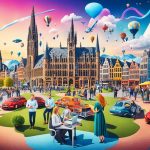Belgium and the Netherlands are two countries that often come to mind when choosing the optimal environment to establish your business. Both countries boast excellent conditions for businesses of all sizes, offering stable economies, strong infrastructures, and favourable tax regimes.
However, deciding whether to start your business in the netherlands or Belgium is not a decision to be taken lightly. There are several key factors to consider, such as the legal requirements of each country, the availability of skilled labor, and access to markets.
In this article, we will explore the decision-making process to help you determine whether your business should be based in Belgium or the Netherlands, and what factors to consider. We will also discuss the business ideas in Belgium and the Netherlands, best businesses to start, setting up your business, and key differences between these two countries. We will evaluate the pros and cons of establishing your business in both countries so that you can make an informed decision.
Key Takeaways:
- Belgium and the Netherlands offer excellent business environments, but different aspects may appeal to different businesses
- Favorable tax regimes, access to markets, and local talent pool are critical factors to consider when deciding where to base your company
- Belgium has a thriving tech, logistics, and healthcare industry, while the Netherlands is known for its innovation and entrepreneurship in agriculture, communication, and technology
- Setting up a business in either country requires a legal registration process and necessary documentation
- Ultimately, the best decision will depend on your specific business needs and goals
Business Opportunities and Ideas in Belgium
If you’re considering starting a business in Belgium, you’ll be glad to know that there are plenty of opportunities and ideas for aspiring entrepreneurs. The country’s strategic location, highly educated workforce, and diverse economy make it an attractive destination for starting a business. Let’s take a closer look at some of the business opportunities and ideas that can lead to success in Belgium.
E-commerce
With the rise of online shopping and e-commerce, there’s a significant opportunity for entrepreneurs to start an e-commerce business in Belgium. The country has a high internet penetration rate and a tech-savvy population, making it an ideal market for online businesses. Additionally, setting up an e-commerce business in Belgium is relatively easy, with many reliable and affordable e-commerce platforms available.
Food and Beverage
Belgium is famed for its cuisine, beers, and chocolates. The country has a vibrant food and beverage sector, which presents a plethora of business ideas for entrepreneurs. With the growing trend towards healthier eating and organic produce, there’s tremendous potential to start a healthy food restaurant or organic food store in Belgium.
Healthcare and Life Sciences
Belgium has a thriving healthcare and life sciences sector, making it an excellent destination for entrepreneurs looking to start a business in this field. The country has a highly skilled workforce and a supportive regulatory environment, which makes it easier to set up a healthcare or Life Sciences company. With the increase in demand for personalized medicine and innovative medical technologies, Belgium offers a fertile ground for entrepreneurs to explore new ideas.
“Belgium has a highly developed transportation infrastructure, including an extensive seaport network, which makes it an attractive location for export and import businesses.”
Export and Import
Belgium offers entrepreneurs a strategic location at the heart of Europe, making it an excellent place for businesses that want to export to Europe or import goods from Europe. With a highly developed transportation infrastructure, including an extensive seaport network, Belgium provides access to over 500 million consumers in Europe. This makes the country an attractive location for export and import businesses.
| Industry | Potential for New Entrant |
|---|---|
| IT and Software | High |
| Clean Energy | High |
| Logistics and Transportation | Medium |
| Consulting Services | Medium |
| Education and Training | Medium |
Other promising industries in Belgium include IT and software, clean energy, logistics and transportation, consulting services and education and training. These are sectors that are experiencing growth and offer potential for entrepreneurs to start successful businesses.
Best Businesses to Start in Belgium
If you’re considering starting a business in Belgium, it’s important to have a clear understanding of the industries that are currently experiencing growth and have the potential for profitability.
Here are some of the best businesses to start in Belgium:
| Industry | Potential for Profitability |
|---|---|
| Technology | Belgium is a hub for technological innovation, with a highly skilled workforce and supportive business environment. The country is home to many tech startups and established companies, making it an ideal location for launching a tech-focused business. |
| E-commerce | The e-commerce sector in Belgium has been steadily growing, with an increasing number of consumers turning to online shopping. This presents a significant opportunity for entrepreneurs looking to start an online business. |
| Food and Beverage | Belgium is known for its world-renowned chocolate, beer, and waffles, making it an ideal location to start a food and beverage business. The country’s high-quality ingredients and culinary expertise attract foodies from all over the world, creating a vibrant market for new businesses. |
Tip: To ensure success, it’s essential to conduct thorough market research and develop a solid business plan that aligns with your goals and the local market conditions.
Setting Up Your Business in Belgium
When planning to embark on a business venture, the process of setting up can be overwhelming, especially with regulations and procedures varying by country. This section will guide you through the process of setting up your business in Belgium, ensuring a successful establishment.
Legal Requirements
Before registering your business, it is crucial to meet the legal requirements set out by Belgian law. These include having a legal form for your business, registering for a value-added tax (VAT) number, and obtaining any necessary permits or licenses for your sector.
Registration Procedures
The next steps involve registering your business with the relevant authorities. This includes registering your business with the Belgian Chamber of Commerce and ensuring that your business is registered with the social security authorities and the National Office for Social Security (NOSS). Additionally, you will need to register with the relevant municipalities or provinces for local taxes.
Necessary Documentation
When registering your business, certain documentation is required, such as a company constitution agreement, articles of association, and bank account details. It is essential to ensure that these documents are in order before starting the process.
Business Landscape in the Netherlands
If you’re considering setting up your business in the Netherlands, it’s essential to have an understanding of the country’s business landscape. The Netherlands is known for being an optimal environment for business, attracting entrepreneurs and international companies alike.
The country boasts a stable economy with a strong focus on innovation, particularly in the tech industry. In addition, the Netherlands has a central location in Europe, making it a prime location for accessing European markets.
One significant advantage of doing business in the Netherlands is the presence of international companies. The country is home to many headquarters of multinational corporations, offering opportunities for partnerships and collaborations. Moreover, the ease of doing business is high, with efficient procedures for setting up and running a company.
Business Environment in the Netherlands
The business environment in the Netherlands is dynamic and competitive, featuring a diverse range of industries. The top industries in the country include:
| Industry | Contribution to GDP (2020) |
|---|---|
| Agriculture and Food | 2.7% |
| Chemicals | 3.9% |
| Energy | 2.9% |
| High Tech Systems and Materials | 4.5% |
| Life Sciences & Health | 5.1% |
| Logistics | 5.6% |
| Tourism | 4.5% |
These industries offer a wealth of opportunities for entrepreneurs and businesses looking to grow and expand. In addition, the Netherlands is home to many start-ups and scale-ups that have gained international recognition.
“The Netherlands’ combination of a strategic location, high quality infrastructure, and innovation capacity makes it an excellent location for companies to establish a European headquarters or research and development center” – Invest in Holland
Overall, the business landscape in the Netherlands presents a compelling case for entrepreneurs and established companies alike. The country’s stable economy, attractive location, and business-friendly policies make it an exciting place to build and grow your business.
Promising Business Opportunities in the Netherlands
The Netherlands is a country that offers a plethora of promising business opportunities for entrepreneurs and established businesses alike. In recent years, the Dutch economy has undergone significant growth, with sectors such as technology and agriculture leading the charge.
Technology
The technology sector in the Netherlands is highly attractive, with Amsterdam becoming a hub for tech startups. The city is home to successful companies such as Booking.com and TomTom. The Dutch government is also actively promoting technological innovations by providing financial assistance and tax benefits to companies involved in research & development.
Agriculture
The agriculture industry in the Netherlands continues to flourish thanks to its advanced infrastructure and efficient farming techniques. The country is the world’s second-largest exporter of agricultural products, contributing significantly to the economy. The Dutch agricultural sector specializes in areas such as meat, dairy, horticulture, and floriculture.
The Dutch economy is open and innovative, offering tremendous potential for those looking to invest and establish a business in the region.
Other thriving sectors in the Netherlands include logistics, healthcare, and renewable energy. With its strategic location in Europe and a highly-educated workforce, the Netherlands is well-positioned to provide businesses with ample opportunities for growth and expansion.
Establishing Your Business in the Netherlands
If you are considering establishing your business in the Netherlands, it is vital to know the legal requirements and registration procedures to guarantee a smooth setup. Firstly, you need to decide on the legal business structure that best serves your needs and objectives.
The most common legal entities in the Netherlands are the private limited company (BV) and the public limited company (NV). The BV is the most straightforward and affordable legal entity to set up and operate; it is ideal for small and medium-sized enterprises. NV is a suitable option for larger corporations as it offers more flexibility in terms of financing and administration.
Before establishing your business, you must register it with the Dutch Commercial Register at the Chamber of Commerce (KvK). This registration enables you to obtain a VAT number and the necessary permits and licenses. It is also essential to register your employees with the Dutch Tax and Customs Administration.
Furthermore, you need to obtain a Dutch business bank account, which requires a valid ID and Dutch residency or a registered address in the Netherlands. The Dutch bank account will enable you to receive payments and pay taxes and expenses, among other financial transactions. You may also need to apply for relevant permits and licenses depending on your business activities and location.
Finally, it is crucial to comply with Dutch regulations and laws, including tax obligations, labor laws, and business regulations. The Netherlands has a favorable business climate, which offers numerous benefits for establishing your business here.
Key Differences Between Belgium and the Netherlands
When considering where to base your company, it’s essential to understand the key differences between Belgium and the Netherlands. These variations can significantly impact your business operations and bottom line. In this section, we will examine some of the vital differences in the business environment, tax regulations, labor laws, and overall market conditions.
Business Environment
Belgium and the Netherlands offer unique business environments. Belgium’s central location in Europe makes it an ideal hub for cross-border trade within the EU. It also has a highly skilled workforce and a diverse economy, which is attractive to new businesses.
The Netherlands is also a hub for international trade, with Amsterdam acting as a gateway to Europe. The country boasts an innovative and technology-driven economy, making it ideal for companies that prioritize research and development.
Tax Regulations
Belgium has one of the highest corporate tax rates in Europe, at 29.58%. However, it offers several incentives to companies, such as tax credits for research and development.
The Netherlands, on the other hand, has a lower corporate tax rate of 25%. It also has a favorable tax climate for holding and financing companies, making it an attractive destination for multinationals.
Labor Laws
The labor laws in Belgium are relatively rigid, making it challenging for companies to adjust their workforce to changes in demand. However, it offers several benefits to employees, such as generous social security and healthcare systems.
Contrastingly, the Netherlands has more flexible labor laws, making it easier for companies to hire and fire employees based on market demand. It also has a comprehensive social security system, which ensures that employees are covered in case of unemployment or disability.
Market Conditions
Belgium’s economy is primarily driven by the service sector, with significant contributions from manufacturing and agriculture. The country has a high GDP per capita and purchasing power, making it an attractive market for international companies.
Similarly, the Netherlands’ economy is driven by the service sector, with a significant focus on exports. The country has a high GDP per capita and is a top destination for foreign direct investment.
Overall, both Belgium and the Netherlands offer unique advantages as business destinations. The choice between the two depends on your specific business needs and goals. Consider the differences highlighted in this section to make an informed decision.
Pros and Cons of Setting Up in Belgium
If you want set up a company in Belgium, it is a prime location for businesses looking to establish themselves in Europe. Its strategic location, skilled workforce, and favorable business environment make it an attractive destination. However, before deciding to set up your business in Belgium, it is essential to consider the pros and cons.
Pros
- Tax Incentives: Belgium offers a range of tax incentives to attract foreign investment. These include a notional interest deduction and a reduced corporate tax rate for SMEs.
- Access to Markets: Belgium’s central location provides easy access to major European markets, making it an ideal location for distribution centers and logistics companies.
- Skilled Talent Pool: Belgium has a highly educated and skilled workforce, making it an excellent location for businesses that require specialized talent.
- Cultural Diversity: Belgium is a multicultural country with multiple official languages, making it an ideal location for businesses looking to expand their international reach.
Cons
Despite its advantages, setting up a business in Belgium does come with some challenges:
- High Business Costs: Belgium has one of the highest tax burdens in the world, and the cost of complying with regulations is also high.
- Complex Regulations: Belgium’s tax and legal system can be complex and challenging to navigate, especially for foreign investors.
- Language Barrier: While many Belgians speak English, the country’s official languages are French and Dutch, which could be a barrier for businesses that don’t have employees who speak these languages.
In summary, setting up a business in Belgium has both advantages and challenges. It is essential to carefully evaluate these pros and cons to determine whether Belgium is the right choice for your business.
Pros and Cons of Setting Up in the Netherlands
If you are considering to set up a company in the Netherlands, it’s essential to weigh the pros and cons carefully. Here are some of the significant advantages and disadvantages:
| Pros | Cons |
|---|---|
| The Netherlands has a favorable tax regime, including a 15% corporate tax. | The cost of living and labor in the Netherlands is relatively high, which could impact your bottom line. |
| The Netherlands has excellent infrastructure, making it easy to transport goods and access neighboring markets. | The Dutch business environment can be competitive, which may pose a challenge for newcomers. |
| The Netherlands has one of the most robust international business communities in Europe, providing ample opportunities for networking and growth. | The Dutch bureaucracy can be slow and complex, particularly for non-Dutch speakers. |
In conclusion, setting up your business in the Netherlands can offer numerous advantages, from a favorable tax regime to excellent infrastructure and a thriving international business community. However, it’s important to consider the high cost of living, competitive business environment, and bureaucratic hurdles carefully. Ultimately, your decision should depend on your specific business needs and goals, as well as your willingness to navigate the challenges of establishing your company in a new country.
Conclusion
Choosing between Belgium and the Netherlands as a location to base your company can be a tough decision, but ultimately depends on your specific business needs and goals. Both countries offer an optimal environment for business, but have their unique advantages and disadvantages that need careful consideration.
Belgium boasts a booming tech industry and highly skilled labor force, while the Netherlands offers favorable tax regulations and a robust infrastructure. Depending on the sector you intend to operate in, one country may be more advantageous than the other.
Ultimately, the decision to base your company in Belgium or the Netherlands must be based on your unique business requirements. While both countries have their pros and cons, they are excellent locations that provide ample opportunities for startups and established businesses alike.
Consider the key factors discussed in this article, such as the business landscape, legal requirements, and tax regulations. We hope this article has provided valuable insights and information to help you make an informed decision on where to base your company.
Good luck in your business endeavours!
FAQ
Can I base my company in either Belgium or the Netherlands?
Yes, both Belgium and the Netherlands provide an optimal environment for establishing your company.
What business opportunities and ideas are prevalent in Belgium?
Belgium offers a range of business opportunities and ideas, with thriving industries in sectors such as technology, logistics, healthcare, and renewable energy.
What are the best businesses to start in Belgium?
The best businesses to start in Belgium currently include e-commerce, digital marketing agencies, sustainable product manufacturing, and co-working spaces.
How do I set up my business in Belgium?
Setting up a business in Belgium requires fulfilling legal requirements, registering your company, obtaining the necessary documentation, and complying with taxation and employment regulations.
What is the business landscape like in the Netherlands?
The Netherlands offers a stable and thriving business landscape, with a strong presence of international companies, excellent infrastructure, and a favorable climate for entrepreneurship.
What promising business opportunities are available in the Netherlands?
The Netherlands presents promising business opportunities in sectors such as renewable energy, technology, e-commerce, sustainable fashion, and food innovation.
How do I establish my business in the Netherlands?
Establishing a business in the Netherlands involves fulfilling legal requirements, registering your company with the relevant authorities, and complying with tax and employment regulations.
What are the key differences between Belgium and the Netherlands for businesses?
Key differences between Belgium and the Netherlands include variations in tax regulations, labor laws, access to markets, and overall market conditions.
Can you provide an overview of the pros and cons of setting up in Belgium?
Pros of setting up in Belgium include tax incentives, access to the European market, and a highly skilled workforce. The cons include complex bureaucracy and a relatively higher cost of living.
What are the pros and cons of setting up a business in the Netherlands?
Pros of setting up in the Netherlands include a favorable tax regime, excellent infrastructure, and access to an international business community. The cons include strong competition and a higher cost of labor.
What is the conclusion regarding basing my company in Belgium or the Netherlands?
The conclusion will summarize the key insights discussed throughout the article and provide a final recommendation based on your specific business needs and goals.































